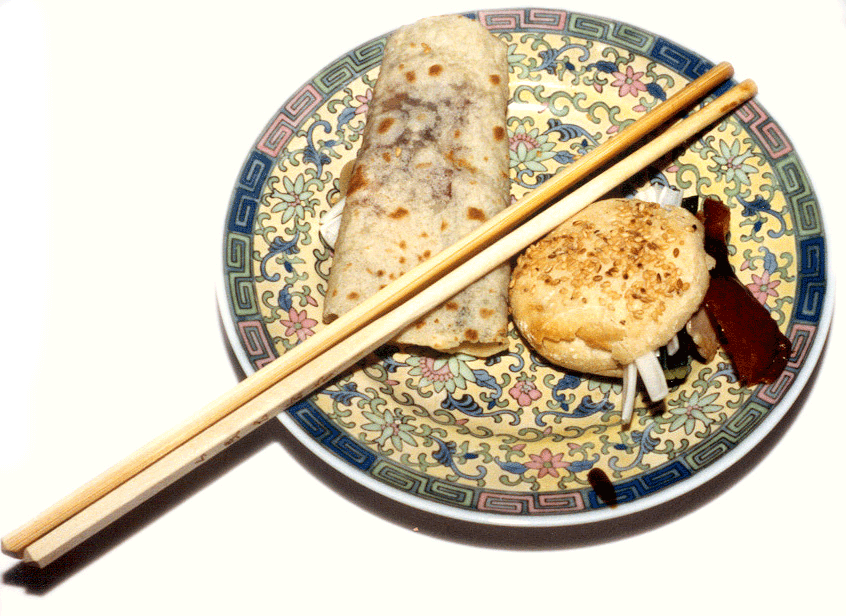|











|
|
 Chopsticks are not difficult to manage.
They are grasped a little below
their midpoint, with the smaller ends toward the plate, or bowl. The
upper, chopstick is held between the pads of the thumb, index, and middle
fingers. The lower chopstick remains stationery between the middle of the
thumb and index finger and on the pad of the third finger, which supports
it. Food is manipulated by the spreading movement of the upper chopstick
to encompass the food and then the food is grasped with the aid of the
lower chopstick. Firm and steady pressure will hold the food between the
tips until it reaches the mouth. Too firm a pressure will cause the
food-laden ends of the chopsticks to slip past each other, scattering the
food on the plate. A learner should not attempt to pick up everything
without first discriminating between dull-surfaced objects, elusive,
slippery objects, or indefinite loose particles. Dull-surfaced objects can
be picked up directly with the chopsticks, whereas loose objects must be
lifted by sliding the chopsticks under them and more or less scooping them
up. The bowl should be held in the fingers or palm. This shortens the
distance the food travels from bowl to mouth. To master the skill takes
only a little practice and perseverance; an early clumsiness should not
discourage one. As with any manual skill, it takes time to learn. Chopsticks are not difficult to manage.
They are grasped a little below
their midpoint, with the smaller ends toward the plate, or bowl. The
upper, chopstick is held between the pads of the thumb, index, and middle
fingers. The lower chopstick remains stationery between the middle of the
thumb and index finger and on the pad of the third finger, which supports
it. Food is manipulated by the spreading movement of the upper chopstick
to encompass the food and then the food is grasped with the aid of the
lower chopstick. Firm and steady pressure will hold the food between the
tips until it reaches the mouth. Too firm a pressure will cause the
food-laden ends of the chopsticks to slip past each other, scattering the
food on the plate. A learner should not attempt to pick up everything
without first discriminating between dull-surfaced objects, elusive,
slippery objects, or indefinite loose particles. Dull-surfaced objects can
be picked up directly with the chopsticks, whereas loose objects must be
lifted by sliding the chopsticks under them and more or less scooping them
up. The bowl should be held in the fingers or palm. This shortens the
distance the food travels from bowl to mouth. To master the skill takes
only a little practice and perseverance; an early clumsiness should not
discourage one. As with any manual skill, it takes time to learn.
When a diner has finished eating, the chopsticks should be placed together
pointing away from him or her on his or her bowl, thus indicating that,
although he has finished eating, other guests should continue enjoying
their food. Eating with chopsticks is the best way to enjoy Chinese food
since it permits just the right amount of sauce on a morsel.
 . . |